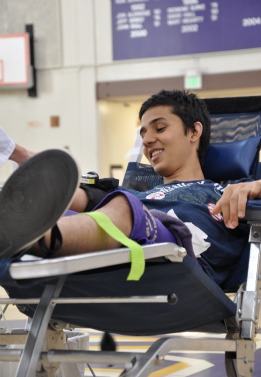Health commission’s biannual blood drive thrives with many donations
In the course of one day, they changed the face of our school. They invaded the student center. They took the blood of our student body. And by 4 p.m., they were gone without a trace.We knew they were coming.And we were glad to help them.
They were Health Commission, hosting their biannual blood drive in partnership with the Stanford Medical Center on Nov. 5, to a turnout of 124 participants, of whom 93 were accepted as donors and 31 were rejected on the basis of medical history or blood iron levels. Each donor gave a pint of blood, capable of helping up to three people in need. The drive was open to everyone interested, though donors were required to be at least 16 years old and weigh over 110 lbs. Upon finishing the procedure, those who took part in the drive were rewarded with a movie ticket and a buffet.
“It is an all-day event,” said senior Health Commission member Grace Huang. “Two Commission members will be coordinating the event during shifts every period. We’ll also be helping with the setup and the cleanup.”
This year, special attention was given to promotion of the blood drive, including distribution of flyers to students, classroom visits, and, of course, posters.
“I figured I could either do something good or choose not to, and at no real cost to me,” said junior donor Faraz Abidi.
But for senior Deepthi Mahesh, giving blood is more than any regular act of charity-it’s a family tradition.
“My whole family has been giving blood for a couple of years,” she said. “It’s something that I can do now, as before I wasnít old enough. Taking part this year is going to be really special for me.”
Maheshís experience with donation stretch back to helping out her sick great grandfather in India. Like both Mahesh and her father, he was A positive, and so they were the first to turn to for blood donation.
Though scared by the initial notion of facing the needle, Maheshís experience ultimately brought her a sense of pride for being able to help out her great grandfather.
“He had done so much for me, so it was the least that I could have done for him,” she said.
Though Mahesh was turned down from participation because of a recent trip to India, her experience with family served as encouragement to participate. It is my way of helping others,” she said. “I can’t medically assist people since Iím not a doctor, so this is my way of pitching in to help them out.”








